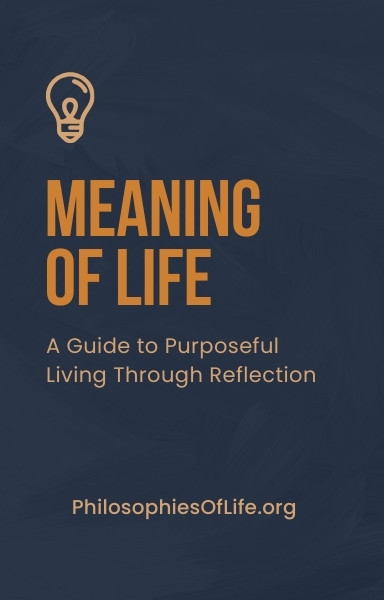We’ve Put Together a Short Ebook to Help You Start Your Journey
Life can feel like a blur without a deeper sense of purpose. This engaging book combines profound quotes from great thinkers with action-oriented journaling prompts to help you reconnect with your values, revitalize your motivation, and cultivate emotional resilience. Take the first step toward building a life of significance and momentum.
Many People Feel They’re Just “Going Through the Motions”
Life can often feel like an endless cycle of obligations and expectations, leaving you questioning if you’re truly living or just going through the motions. Many people face a lack of purpose, feeling trapped in routines that fail to provide deeper meaning. Without addressing this, every day starts to feel like a hollow repetition, draining your energy and motivation. Add to that the constant battle with work-life imbalance—career demands pulling you in one direction while personal responsibilities pull in another. The result? No time for self-reflection or meaningful fulfillment, leaving you burned out and perpetuating the cycle.
Uncertainty looms, as troubling questions about whether you’re on the right path or making choices that align with your true desires creep in. Stress and burnout become commonplace, fueled by the pressures of success, family obligations, and societal expectations. If left unchecked, this can take a toll on your health, relationships, and mental well-being. Despite outward accomplishments, a lack of emotional fulfillment may weigh on you—an emptiness that can’t be filled with promotions or possessions. Navigating major life changes, from career shifts to evolving personal relationships, often brings confusion and anxiety, compounding the existing struggles.
And then there’s the inevitable confrontation with aging and mortality. Facing the reality of growing older and questioning whether you’ve made a meaningful impact can be overwhelming. Disconnected relationships are another casualty in the quest to “have it all,” leaving you feeling isolated in a sea of acquaintances rather than surrounded by deep, supportive connections. Even financial and material success can feel shallow when inner happiness remains elusive. That gnawing feeling—wondering who you are, what your legacy will be, and why you’re truly here—can be paralyzing if ignored. But it doesn’t have to stay that way.
“The unexamined life is not worth living.”
– Socrates
Discover the Meaning of Life: A Guide to Purposeful Living Through Reflection
This ebook is designed specifically for people who feel the weight of modern challenges – from lack of direction to managing stress, from work-life imbalance to finding meaningful relationships. It’s a collection of powerful quotes and thought-provoking journaling prompts to help you uncover clarity, ignite inspiration, and take actionable steps toward a more fulfilling life.
Why This Ebook Is For You
From Nietzsche to the Dalai Lama, this ebook combines centuries of profound insights in bite-sized reflection points that are easy to integrate into your daily life.
What’s Inside
- 20+ Timeless Quotes: Explore thought-provoking ideas from philosophers, thinkers, and visionaries like Aristotle, Buddha, and Marcus Aurelius.
- Guided Journaling Prompts: Unlock deeper insights into your purpose, values, and goals through thoughtful questions
- Practical Strategies for Growth: Find balance, resilience, and meaning by applying these reflections to your unique life circumstances.
Transform Your Life Now
If you’ve been feeling stuck, disheartened, or overwhelmed, “Meaning of Life: A Guide to Purposeful Living Through Reflection” is your opportunity to rediscover yourself. This ebook isn’t just about inspiration – it’s about transformation.
Start Your Journey Today – Enter Your Email Below to Download for Free

Take the first step toward living with purpose, clarity, and connection. Your best life is waiting.
Bradley Murray, Founder PhilosophiesOfLife.org

Meaning of life: Key concepts and ideas
What do we mean by the “meaning of life?”
The phrase “meaning of life” is one of the most profound and debated concepts in human existence, often evoking thoughts that transcend the physical realm of daily life. It refers to the purpose, significance, or reason for being and is a question that has intrigued philosophers, scientists, theologians, and everyday people throughout history. At its core, the idea of the “meaning of life” seeks to uncover why we are here, the value of our actions, and what governs the essence of our existence on Earth.
Philosophical interpretations of the “meaning of life” vary widely. For example, existentialist thinkers like Jean-Paul Sartre and Albert Camus argued that life inherently holds no predefined meaning and that humans must create their own purpose through choices, actions, and personal responsibility. Camus, famously presenting the idea of the absurd, suggested that the tension between humanity’s search for meaning and the universe’s indifference to it is central to the human condition. On the other hand, Aristotle and other classical philosophers viewed human life as meaningful when it aligned with specific virtues and the pursuit of eudaimonia, often understood as human flourishing or fulfillment.
Religious perspectives often provide structured interpretations of life’s purpose, offering meaning derived from divine plans or spiritual beliefs. Many religions teach that the meaning of life involves aligning with the will of a higher power, contributing to the collective good, or preparing for an existence beyond this earthly one. For instance, in Christianity, the meaning of life often involves living according to God’s commandments, serving others, and developing a relationship with the divine. Similarly, Buddhist philosophy might frame the meaning of life as the pursuit of enlightenment, an ultimate state of liberation from the cycle of suffering.
From a scientific standpoint, the “meaning of life” is sometimes reframed as a question of existence and biological processes. Evolutionary biology places human life within the broader context of the natural world, positing that our purpose could be linked to survival and reproduction. Many in the scientific community, however, emphasize that meaning is a human construct, shaped by our cognitive abilities to reflect, interpret, and create frameworks of understanding.
Cultural and personal interpretations also play a significant role in shaping the perceived meaning of life. Different societies emphasize values and goals that inform an individual’s sense of purpose. For example, Western cultures might prioritize self-discovery and individualism, while many Eastern traditions focus on collectivism and harmony with nature or community. At the individual level, the meaning of life becomes deeply subjective. Personal beliefs, goals, relationships, and experiences often serve as the primary source of purpose. For one person, meaning might come from creative expression or scientific discovery, while for another, it could be rooted in nurturing family bonds or contributing to societal change.
Ultimately, the meaning of life is a profoundly personal and complex question that remains open to interpretation. Whether derived from philosophical inquiry, spiritual faith, or individual aspirations, the quest to find meaning continues to be a fundamental part of what it means to be human. It encourages introspection, inspires creativity, and fosters connections, underscoring the inherent richness and depth of the human experience.
Meaning, purpose, and happiness
The connection between the meaning of life, the purpose of life, and happiness is a profound and multifaceted relationship that has intrigued philosophers, scientists, and thinkers throughout human history. While each concept stands on its own, they are deeply intertwined and often influence each other, shaping the way individuals perceive and experience their existence.
At its core, the meaning of life is often interpreted as the overarching significance of human existence. It is the question of why we are here, and its interpretation varies greatly depending on one’s beliefs, culture, and life experience. For some, the meaning of life might be found in religious or spiritual frameworks, connecting human existence to a divine plan, a higher power, or the cycle of life and death. For others, meaning is more subjective, found within personal passions, relationships, achievements, or the act of simply being present in the moment. The pursuit of the meaning of life can often provide individuals with a greater sense of perspective and clarity, aiding in grounding their thoughts and actions.
Closely related to the meaning of life is the purpose of life, which is often more personal and specific. Purpose can be defined as the driving force that motivates individuals in their daily lives—a particular goal, passion, or duty that gives structure and direction. Purpose acts as a compass, guiding behaviours, decisions, and long-term plans. It is often best illustrated in areas such as career, creativity, or social contributions, which afford individuals a chance to align their actions with their core values. For instance, someone who derives meaning from helping others may find their purpose in acts of service, such as teaching, caregiving, or philanthropy.
Happiness, in this context, intersects with both meaning and purpose, functioning as an emotional state that reflects overall well-being and contentment. While happiness is often regarded as fleeting or momentary—a pleasant mood or feeling of joy—it can also take the form of a more sustained fulfillment derived from living a meaningful and purposeful life. It is important to note that chasing after momentary happiness alone, such as indulging in material pleasures, rarely leads to lasting satisfaction. Instead, happiness often flourishes when individuals align their day-to-day choices with their deeper values and life’s meaning.
The connection between these three concepts becomes evident when one considers the impact of purpose and meaning on sustained happiness. Studies in psychology have shown that individuals who pursue intrinsic goals—such as personal growth, relationships, and contributions to the community—tend to experience a greater sense of life satisfaction compared to those who focus on extrinsic rewards, like wealth or status. For instance, engaging in meaningful work or relationships fosters a sense of belonging and accomplishment, which in turn nurtures happiness. Similarly, having a clear sense of purpose can guide one through challenges and hardships, providing resilience and optimism even in difficult times.
This interaction between meaning, purpose, and happiness is cyclical and mutually reinforcing. A sense of meaning can spark motivation to uncover one’s purpose, while having clear goals can solidify that sense of meaning. Happiness, on the other hand, serves as both the outcome and amplifier of this dynamic. When individuals feel fulfilled by their purpose and confident in the meaning they assign to their lives, happiness becomes a natural byproduct. Conversely, those who lack a clear sense of meaning and purpose often report feelings of emptiness, dissatisfaction, and confusion—a state that hampers their ability to experience joy.
Importantly, the path to uniting these three elements is not always straightforward and may take time and reflection. Different stages of life or external circumstances—such as career transitions, family dynamics, or unexpected setbacks—can cause individuals to reevaluate their meaning and purpose or alter their conception of happiness. Recognizing that meaning, purpose, and happiness are flexible and personal helps individuals avoid the pressure of conforming to societal expectations, instead allowing them to craft a life that resonates with their unique values.
Ultimately, the connection between meaning, purpose, and happiness underscores the importance of introspection and intentional living. By considering what gives life meaning, identifying sources of purpose, and cultivating habits that lead to genuine happiness, individuals can create a harmonious balance that contributes to a fulfilling existence. This trinity of concepts forms the foundation of a life well-lived, guiding humans in their universal quest to make sense of the profound yet beautiful experience of being alive.
Why it is important to reflect on the meaning and purpose of life
Thinking about the meaning of life is an essential exercise that allows individuals to reflect on their existence and place in the world. At its core, contemplating life’s purpose equips people with a sense of direction, guiding them through personal decisions, moral dilemmas, and long-term goals. Without this reflection, life can sometimes feel aimless, leaving individuals longing for clarity and fulfillment. By considering such profound questions, we are able to carve out a deeper connection with ourselves, others, and the broader universe.